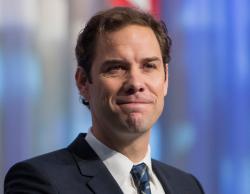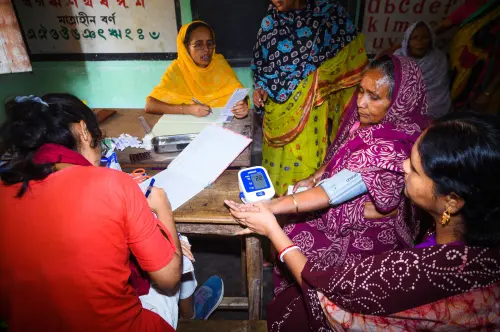What a difference a year can make. After generating more than 130 public products within in its first 365 days—research papers, journal articles, book chapters, policy reports, blogs, op-eds, podcasts, and public events—the Center for Sustainable Development (CSD) at Brookings celebrated our first birthday this past week, on October 21.
CSD was launched with a vision of providing leading research, insights, and convenings to advance global sustainable development and implement the Sustainable Development Goals (SDGs) within and across all countries—including advanced economies. In our public launch event last October, we were honored that so many extraordinary leaders from around the world conveyed encouragement and support. We were especially grateful that Ms. Amina Mohammed, U.N. deputy secretary-general, and Dr. Rajiv Shah, president of The Rockefeller Foundation, joined to discuss so many of the world’s frontier challenges of sustainable development. We took to heart the deputy secretary-general’s reminder that “None of us can achieve the SDGs alone,” and her challenge to the center “to strive to be a beacon of inspiration for the pursuit of sustainable development in all countries and communities around the world.”
Some highlights
One year later, as this stock-taking file shows, CSD scholar teams have taken up the challenge with vigor, making contributions across a wide range of sustainable development topics, including:
- The SDGs & global sustainable development.
- Climate change.
- Cities and local leadership.
- Workforce of the future.
- Global debt crisis.
- Ending extreme poverty and deprivation.
- Global development cooperation.
- U.S. domestic sustainable development policy.
- U.S. global sustainable development policy.
- Gender equality.
- The global middle class.
However impressive the volume of CSD outputs might be, our team cares vastly more about the quality and results of its efforts. In the world of research and ideas, it is generally unwise for any single actor to try to claim too much credit, but we are fortunate to have a unique roster of scholars who are contributing in so many exceptional ways. To share a few examples:
- Amar Bhattacharya co-chaired the U.N. Secretary General’s Independent Expert Group on Climate Finance, which published its seminal report last December on “Delivering on the $100 Billion Climate Finance Commitment and Transforming Climate Finance.” More recently, Amar has been named a member of the World Bank-IMF High-Level Advisory Group (HLAG) on Sustainable and Inclusive Recovery and Growth, co-chaired by Mari Pangestu of the World Bank, Ceyla Pazarbasioglu of the IMF, and Lord Nicholas Stern of the London School of Economics. Amar is deeply involved in global climate deliberations in the lead-up to the forthcoming COP 26 U.N. climate summit in Glasgow, U.K., including as adviser to the Coalition of Finance Ministers for Climate Action and adviser to the COP 26 presidency. He and Lord Stern recently co-authored an important op-ed on “Our Last, Best Chance on Climate.”
- Marcela Escobari has continued to pioneer the Workforce of the Future initiative at Brookings, bringing extraordinary data richness and rigor to advance opportunities for place- and job-specific worker mobility in geographies across the United States. Her mobility pathway tool, a multiyear team project summarized in a blog with Natalie Geismar, generated important public interest, including high-profile coverage in the New York Times. More recently, Marcela published, along with Ian Seyal and Carlos Daboin Contreras, a Moving Up report that reveals multidimensional hurdles to labor mobility across America, especially for people in low-income occupations. We are very proud that, earlier this year, President Biden nominated Marcela to serve as USAID Assistant Administrator for Latin America and the Caribbean, a position she previously held under the Obama Administration. While awaiting Senate confirmation for the appointment, Marcela is continuing to press forward her research on the role companies can play in improving job quality.
- George Ingram drew from his extensive policy experience to publish a series of important papers following the 2020 presidential election, including a prescription for renewing U.S. global partnership in a post-COVID-19 world. George also celebrated a victory for good data in a recent post co-authored with Sally Paxton of Publish What You Fund (PWYF). They noted the fruits of a multiyear collaborative research effort to address conflicting official U.S. aid data, which previously could vary by up to billions of dollars per year across different government websites. USAID and the Department of State recently agreed to consolidate competing aid data dashboards into a single data collection and reporting channel. In July, George partnered with PWYF to convene a public event on transparency in development assistance for gender equality, which generated several new commitments to improve donor reporting on aid for gender equality. He also issued a call for a U.S. initiative to help bridge the global digital divide among low- and middle-income countries.
- Homi Kharas has been prolific in contributing to global economic debates during the COVID-19 crisis, with special emphasis on steps to avoid a developing country debt crisis amid the deepest and most widespread global recession in modern history. The U.N. Secretary-General recognized Homi’s paper with Meagan Dooley on “Debt Distress and Development Distress: Twin crises of 2021” as foundational to his March 2021 U.N. report on “Liquidity and Debt Solutions to Invest in the SDGs: The Time to Act is Now.” Concurrently, Homi and co-authors generated world-leading empirical assessments of extreme deprivation (e.g., here and here), including extreme poverty in the context of COVID-19. He also published, with Raj Desai and Selen Özdoğan, important research on the spatial dimensions of global poverty reduction. Impressively, Homi was recently named alongside Amar Bhattacharya to serve on the HLAG on Sustainable and Inclusive Recovery and Growth.
- Tony Pipa has been advancing a remarkable range of efforts on localized leadership for sustainable development. This includes a City Playbook for Advancing the SDGs, co-edited with Max Bouchet, which captures an inspiring array of insights from across the global SDG Leadership Cities community of practice that Tony launched and facilitates. In parallel, last November, Tony and Natalie Geismar released a key report with recommendations to reimagine U.S. federal policy for U.S. rural development, informed by lessons and changes in U.S. policy and practice for sustainable development overseas. The report’s insights have been influential with Congress and the Biden administration as they develop new approaches to invest directly in rural America, including the proposed $4 billion Rural Partnership Program currently being considered as part of the budget reconciliation process. Meanwhile, Tony has also spearheaded CSD’s partnership with the UN Foundation to expand and connect American Leadership on the SDGs in communities across the United States.
We are also extremely proud of our collaboration with leaders of the Center for Universal Education (CUE) at Brookings, who amount to the “education team” for CSD. I never go anywhere on SDG 4 (Ensure quality education) without talking with CUE co-directors Emiliana Vegas and Rebecca Winthrop, who have both made enormous public contributions over the past year. Emiliana, for example, co-authored a seminal study on the global cost of COVID-19 school closures in earnings and income, while also publishing an important series of reports on the implementation of computer science education in geographies around the globe. Rebecca has meanwhile led a major initiative on family-school engagement and collaboration to transform and improve education systems. She has also been a driving force in the global movement to advance education for tackling climate change.
For my own part, I have been privileged to co-chair the 17 Rooms initiative in collaboration with Zia Khan and our partners at The Rockefeller Foundation. Within the past year, we have made great progress in describing key design principles for this new approach to problem-solving across all 17 SDGs. This has largely been made possible by CSD’s small but mighty new 17 Rooms secretariat team, comprised of Alexandra Bracken, Jacob Taylor, and Shrijana Khanal. All of them have been central to the progress of both the annual 17 Rooms global flagship process and the growing 17 Rooms-X community of practice. We were honored that U.N. Deputy Secretary-General Amina Mohammed joined the 2021 flagship summit as keynote listener for the second year in a row, commenting on the Room (working group) report-outs that will be published next month in a next wave of action plans and insights. Meanwhile, the 17 Rooms-X efforts are helping universities, communities, regions, and now countries to advance localized action, insight, and collaboration processes for the SDGs. The growing interest in 17 Rooms has helped inform an evolving vision of how the initiative could help fuel a new approach to multilateral cooperation, and even an annual global “17 Rooms Day” for communities around the world.
Looking forward
As much as we take pride in CSD’s accomplishments over the past year, we know we are only a small node in a vastly larger global network of contributors to the broader challenges of sustainable development. Over the coming year, we plan to continue our existing core workstreams while ramping up efforts on key priorities, in line with a spirit of networked leadership. We look forward to the culmination of some major research products, including a book on breakthrough technologies for the SDGs, and to launching a major new effort on gender equality and sustainable development. In parallel, we aim to ramp up work on aligning the private sector with the SDGs—in other words, bridging ESG to SDG. We are keen for our center to serve as a neutral platform that helps bring diverse constituencies together. In that spirit, we are also excited soon to be announcing CSD’s first-ever cohort of nonresident scholars. We are enthusiastic to tap into an ever-larger network of experts and allies who can share insights on both the substance of the center’s work and the opportunities for broader stakeholder engagement.
A center takes a village
Whatever the center has accomplished to date, all of it is only possible thanks to an extensive network of external colleagues, collaborators, contributors, champions, and even constructive critics around the globe. I often say that the center has nearly 8 billion clients, i.e., the full composition of humanity. But there are also countless people whose direct insights, queries, suggestions, and convenings all play a pivotal role in our work. Perhaps most importantly, there are huge numbers of people across the Global Economy and Development program and the broader Brookings Institution who have made each of the center’s first 365 days possible. I convey special personal thanks to Brookings leadership for so strongly backing the CSD enterprise from day one, and every single day thereafter. It’s our privilege to be part of such an extraordinary undertaking. It’s our responsibility to ensure we contribute even more over the year to come.
The Brookings Institution is committed to quality, independence, and impact.
We are supported by a diverse array of funders. In line with our values and policies, each Brookings publication represents the sole views of its author(s).






Commentary
1 year in: Our new Center for Sustainable Development takes stock
October 25, 2021